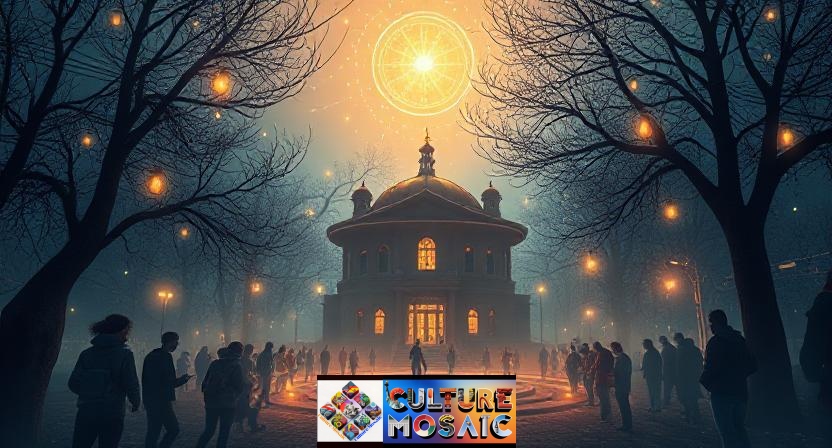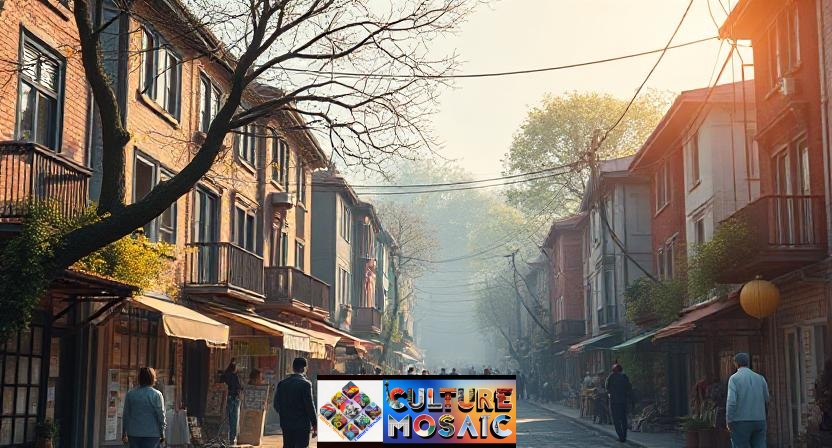What is a Decentralized Society? Learn how Decentralized Societies can empower you to shape your world.
What is a Decentralized Society? Have you ever felt that systems completely control your life, from the giant tech holding all your information, to the bank dictating how you spend, down to the government that decides on things you never even heard about.
Wouldn’t it be nice if there was, for once, a way in which you and your community decide things? This is at the heart of decentralization for society-a world where power is not hoarded by one but is rather dispersed among many-like a busy neighborhood where everyone has a voice. This article breaks down the concept of a decentralized society into eight relatable, human-centric insights, illustrating the way that tools such as the Civic Voices app are realizing that vision.
1. Decentralized society is an egalitarian society

Simply speaking, such a society is imagined to be one where no single leader, governor, company or institution has an overwhelming amount of power. Instead, decisions, resources, and power must be determined collaboratively among individuals and groups as full equals. Just like a potluck dinner where one must bring something to share and nobody else can run the event.
In relation to centralized power structures, in which a singular authority (be it a bank, a federal body or others) maintains full discretionary powers, the decentralized society thrives in a collective manner. Every voice counts — be it for local referendums or those which help you in defining your own digital identity. In this spirit, applications such as Civic Voices allow citizens to voice their ideas directly into the governing process, ensuring that decentralization remains a live reality and not merely theoretical.
2. Centralized vs. decentralized: comparison of a real world
What is a Decentralized Society? Key systems are everywhere – the idea of a social media platform like Facebook, where a company controls your data, or a traditional voting system, where the authorities oversee the process. If the central authority fails or abuses power, the entire system suffers.
A decentralized society turned this model. Imagine an online platform run by a society, where everyone has the same to say, and no single administrator can sensor or close it. If some fail, the rest continues to move, such as a network of solar panels that provide strength to a neighborhood instead of a delicate power plant. Decentralized systems are flexible because they do not depend on a mistake, making them strong and reliable for everyday people.
3. Core Principles That Drive Decentralization

Decentralized communities are made by values that prefer people on electrical structures. What is here they are ticked:
- Openness: Decisions and data are open to see everyone, such as a book from a public account, can be investigated.
- Security: Your information is preserved in many systems, reduces the risk of hack or abuse.
- Inclusion: No one can even the playground, regardless of place, wealth or position.
- Autonomy: You control your own data, money and voice as owning the key to your digital life.
These principles promote distant institutions for you and your society, justice and trust. For example, Civic Voice App uses users to propose and vote on local guidelines, embedding these values in action.
4. Blockchain: Technically driver decentralized communities
Many decentralized systems have blockchain in the core – a digital laser divided into thousands of computers ensures that no single device controls it. Think of it as a tamper -proof notebook where each entry is confirmed by society. When the data is registered, the data cannot be replaced, which makes them safe and transparent.
Cryptocurrency like blockchain power bitcoin and atherium, but the range extends further. Use blockchain to control users, such as decentralized apps, such as voting or identification management. Estonia, for example, uses blockchain for secure digital IDs, and shows how this technology enables decentralized societies by putting power in the hands of humans.
5. Owner of your identity: power of decentralized id

What is a Decentralized Society? Have you ever moaned to register e -mail, phone number or even date of birth? In a decentralized society, you have a confident identity (SSI)-a Digital ID that you control. You decide who sees your data and how they are used, such as carrying a personal, safe passport to the digital world.
With SSI, you can log in to services without providing personal details, reducing the risk of data violations. Platforms such as Civic Voice can integrate SSI, so that users can safely participate in governance without highlighting sensitive information, to strengthen identity management, to strengthen control, without exposing sensitive information.
6. Decentralized Governance: Your Voice Matters
Imagine having a say in the organization of your community, and having that input considered without bureaucrats standing between. Decentralized governance facilitated by Decentralized Autonomous Organizations (DAOs) ensures this. A DAO can be thought of as a kind of digital co-op in which members use tokens to vote on proposals. The votes will constitute decisions that represent the voice of the community.
To illustrate, the Civic Voices app allows users to propose and vote on various local policies, including those pertaining to park improvements and budget priorities. It’s kind of like a town hall meeting, just on a global scale-or right from your mobile phone-with fair and transparent voting processes powered by smart contracts. This is decentralized governance in action; real power for real people.
7. Decentralized Finance: Banking Without Intermediaries
Traditional finance binds the customers with banks and other intermediaries, thus denying access to many. Let us understand DeFi: it is the best piece of technology, lending, borrowing, or investing directly with other people in the world all using blockchain-enabled smart contracts. Cash swapping with your friend is globalized with no possible banks (or the cut).
DeFi also provides opportunities for unbanked persons, more so those from populaces in remote areas, and those lacking credit records. Imagine a farmer in a developing country who goes into borrowing from a global investor directly, using the DeFi market. Middlemen-free decentralized societies set financial fairness and inclusivity for them.
8. Building Trust Via Decentralized Reputation Systems
What is a Decentralized Society? In our modern world, your trustworthiness is often defined by either your credit scores or online reviews, both of which are often controlled by corporations. A decentralized society would allow for your digital reputation to be more like a transportable “trust score” based on your actions across platforms. Consider this a digital form of karma. Helped a neighbor? Participated in a DAO? All of this would matter toward your score.
The transparent and fair nature of the systems built on blockchain is what makes them unique. A Civic Voices discussion on various public policies might stand in good stead as a reputation contributor for an individual. The development of trust amongst citizens who are the real contributors is not dependent on some centralized entity, rather it is dependent on one’s own establishment of reputation.
Challenges of Decentralized Society
While such a great vision tends to inspire, decentralized societies, in fact, have hurdles:
- Scalability: Can systems provide service to millions of users? Blockchain technology is advanced, but not mature enough for this yet.
- Regulation: Some governments oppose decentralization. They will have to go through the legal changes.
- Security Risks: Blockchain networks promise security measures. But there are fraud and user error (other than private key mishaps).
- Accessibility: People are not really very tech-savvy, which is why useful tools like Civic Voices are really important gaps to fill.
Such a change-as practically anything-grants need earnestness, education, and innovation in order to overcome the above-mentioned barricades.
Real-World Examples of Decentralized Societies
What is a Decentralized Society? Decentralization: A real world around:
- Estonia: Blockchain is used for secure digital IDs and e-voice so that the citizens can control their data.
- Civic Voice: With the app, users can propose and vote on guidelines, thus reducing decentralized governance for local communities.
- Ethereum: Daps for everything from finance to art, which shows the flexibility of Powers Blockchain.
- Helium network: decentralized wireless network allows users to share connectivity and earn prizes.
These examples show that decentralized society takes shape, and leads the accusation in well -developed applications as a community engagement.
How can you join a decentralized society
You don’t have to be a technical wizard to participate. Here’s how to start:
- Use Dapps: Try the Civic Voice app to participate in local rule or find platforms such as digital wallet metamas.
- Vote in Daos: Join us on online communities to vote for projects or guidelines.
- Explore Defi: To understand decentralized finance, start small with platforms like Uniswap.
- Support Open Source Code: Contribute or use for the Open Source tool that promotes decentralization.
- Learn: Learn yourself on blockchain and social technology through free resources online.
Each step you have taken – whether it votes for a policy or using a dapp – helps you create a decentralized future.
The future of decentralized communities
What is a Decentralized Society? The journey toward a decentralized society unfolds with thrilling potential and continuous growth. Technologies such as AI, 5G and Internet of Things (IoT) make the system faster and smarter, which can enable simple collaboration. Imagine smart cities, where citizens voted for traffic solutions through apps such as Civic Voice or Global Daos.
The goal is a fair, independent world where you control your data, voice and opportunities. Decentralized society is not right, but they are a bold step toward strengthening everyone, not just powerful.
Conclusion: What is a Decentralized Society?
What is a Decentralized Society? A decentralized society is about holding back the power where he is with you. This is a world where your identity, finance and voice are for your control, not assigned to companies or authorities. Tools like the Civic Voice app make you real by giving you direct shape to the future of your society. While challenges remain, the promise of justice, openness and inclusion creates a movement worth joining in decentralization. So the next time you feel unheard of, remember: A decentralized society gives you a megone.
FAQ About What is a Decentralized Society?
Q1: What is a decentralized society with simple words?
It is a system where power and decisions are shared between many, not controlled by the same authority, as a society where everyone says.
Q2: How does Blockchain support a decentralized society?
Blockchain is a safe, shared digital laser that records data in many computers, ensures openness and prevents a single device from controlling it.
Q3: Can I join a decentralized society without technical skills?
Absolutely! User -friendly equipment such as Civic Voice Apps allows you to use Dapp without the need to participate in management or understand technology.
Q4: Is a decentralized society legal?
In many countries, yes, but the rules are different. Some governments are careful, so promises are still developing to address decentralization.
Q5: What is the risk of a decentralized society?
Challenges include scalability, fraud, regulatory barriers and technical access. Education and user -friendly platforms can help overcome these.
Q6: How does the Civic Voice App Desentralization support?
Civic Voice allows users to propose and vote on local politics, which gives direct voice to local communities in governance without centralized control.
Q7: What are examples of decentralized communities in action?
Estonia’s digital ID, Ethereum’s decentralized applications, and Civic Voice’s policy platform exemplify how decentralization can empower individuals and enhance their everyday lives.
Q8: Why should I care about decentralized societies?
They give you control of the data, speech and finance, making you a fair system where everyone’s contribution means something.

